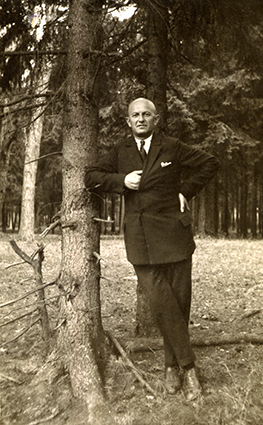Isaac Abramson
This is my father Isaac Abramson. The picture was taken in Siauliai in 1938.
My father, Isaac Abramson, was born in 1887. Having finished cheder he went to one of the Jewish lyceums of Kaunas, though I don’t know how many grades he finished. He was exiled to Ukraine with his family and in 1917 met my mother. In 1917 they got married. They didn’t have a traditional Jewish wedding. It wasn’t the right time: the years of the Revolution, Civil War, hunger and pogroms. In 1918 mother gave birth to my elder brother Abram, and on 13th May 1920 I, Liza Abramson, was born. By that time Lithuania had gained independence from Russia. Many Lithuanian citizens came back to their motherland and in 1921, when I was a year and a half old, our family – my mother, father, brother and I – came back to our motherland in Kaunas, which was the capital of Lithuania at that time. Almost all of my father’s family came back there.
When I was five or six, Father was offered a well-paid job and our family moved to Siauliai. Father was assigned to a good position. He was a representative of the owners of the Guberniya brewery. This company is still an important brewery in Lithuania. Father was a very gifted and literate man. He was fluent in Russian and Lithuanian, both oral and written. He also knew Polish and German. He had a lot of responsibilities: starting from concluding contracts with stock houses and stores and up to quality control of beer. Siauliai was the second city in Lithuania after Kaunas in terms of population and importance. It was multinational. 30-40 percent of the population was Jewish.
Soon Father was given an apartment near the brewery and we moved to a new place. We had a four-room apartment. My parents purchased new furniture. Father started making pretty good money and we felt it. We acquired a beautiful grand piano made of mahogany. Mother played it. My brother and I were taught music at home. Besides, I had an English tutor, who came over to us. We had a housekeeper: a Russian lady, Nina, but my mother, a great cook, didn’t let her cook without her guidance. She spent a lot of time in the kitchen. Food was cooked on primus stoves – there were several of them in the kitchen. There was also a stove, where Mother baked different pies, cakes – tartlets, rolls and all kinds of desserts. I still consider her cake ‘Napoleon’ to be the acme of culinary art. Mother cooked Jewish and Ukrainian dishes. She made wonderful borscht with garlic pies, vareniki [a kind of stuffed dumpling] with meat stuffing, curds and potatoes. Puffy meat patties were always served with broth. I don’t know what kind of cuisine that is.
We had all kinds of modern novelties in the kitchen. In that period of time people started canning food. Father bought a German apparatus with jars and glass lids. Mother made stewed fruit and canned them. Then she put them in a special boiler. We had a fridge in the kitchen: a special crate, where a metal box with ice was put. The ice was brought from the brewery. When it melted, more ice was brought again in a couple of days. There was a special cooler for pickles in the cellar. Father made them. He salted tomatoes, cucumbers, cabbage in large barrels and stored them in the cellar.
